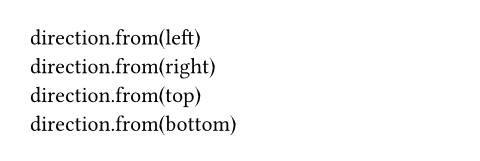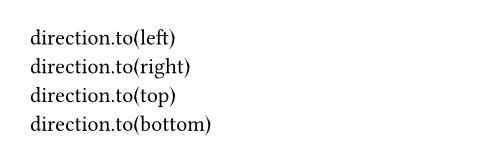direction
The four directions into which content can be laid out.
Possible values are:
ltr: Left to right.rtl: Right to left.ttb: Top to bottom.btt: Bottom to top.
These values are available globally and also in the direction type's scope, so you can write either of the following two:
#stack(dir: rtl)[A][B][C]
#stack(dir: direction.rtl)[A][B][C]

Definitions
from
Returns a direction from a starting point.
 View example
View example
direction.from(left) \
direction.from(right) \
direction.from(top) \
direction.from(bottom)

side
to
Returns a direction from an end point.
 View example
View example
direction.to(left) \
direction.to(right) \
direction.to(top) \
direction.to(bottom)

side
axis
The axis this direction belongs to, either "horizontal" or
"vertical".
 View example
View example
#ltr.axis() \
#ttb.axis()

sign
The corresponding sign, for use in calculations.
 View example
View example
#ltr.sign() \
#rtl.sign() \
#ttb.sign() \
#btt.sign()

start
The start point of this direction, as an alignment.
 View example
View example
#ltr.start() \
#rtl.start() \
#ttb.start() \
#btt.start()

end
The end point of this direction, as an alignment.
 View example
View example
#ltr.end() \
#rtl.end() \
#ttb.end() \
#btt.end()

inv
The inverse direction.
 View example
View example
#ltr.inv() \
#rtl.inv() \
#ttb.inv() \
#btt.inv()
